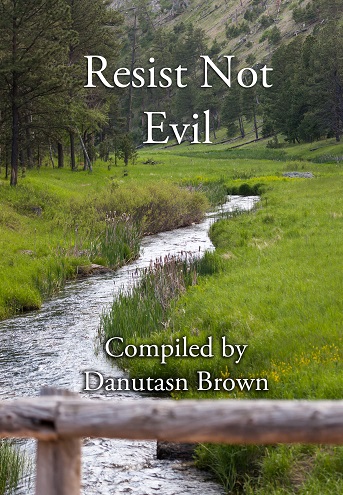Roger Williams Banished into a Blizzard
Recently I was listening to Pastor Adrian's sermon on separation of Church and State and I was so touched by the retelling of one moment in Roger Williams' life: when he was banished from Salem and had to flee into an extraordinarily cold winter.
The nearest place to go was 200 miles away in what would be New York. This is one of the most important moments in the history of the development of separation of church and state. Roger Williams had come up with this idea, seemingly almost through inspiration, and was not going to give up on it though the whole world press him. And press him the world did.
It is interesting how wikipedia describes this event:
Finally, the General Court tried Williams in October 1635 and convicted him of sedition and heresy. They declared that he was spreading "diverse, new, and dangerous opinions" and ordered that he be banished. The execution of the order was delayed because Williams was ill and winter was approaching, so he was allowed to stay temporarily, provided that he ceased publicly teaching his opinions. He did not comply with this demand, and the sheriff came in January 1636, only to discover that he had slipped away three days earlier during a blizzard. He traveled 55 miles on foot through the deep snow, from Salem to Raynham, Massachusetts, where the local Wampanoags offered him shelter at their winter camp. Sachem Massasoit hosted Williams there for the three months until spring.\
When you read that, it seems that Roger Williams was foolish - he gave them reason to arrest him by violating the court order. But as I looked up more about this, I found this:
In October of 1635, after various hearings and disputes over intersecting matters of theology and secular power, Massachusetts Bay banished Roger Williams forcing him to leave the colony’s borders. But with winter coming on and Williams falling ill the court allowed him the courtesy of commuting the sentence until spring on the condition that Williams would not speak publicly in the interim. He consented to this term and agreed not to publicly proclaim his views.
This agreement did not prevent Williams from welcoming his friends and followers into his home and holding private discussions. However, the Massachusetts court viewed even this as a breach of his promise and, in January, 1636, sent armed soldiers led by Captain John Underhill to Williams’ home in Salem to arrest him and put him on a ship bound for England.
https://www.masshist.org/beehiveblog/2014/01/a-long-winter-walk-the-banishment-of-roger-williams/
How important the little details are! Here we see that Williams was not being rebellious; he thought he was following the ruling! So what would happen if he was arrested? "...he would be imprisoned and likely hung for his rebellious beliefs of religious freedom and the need for separation of church and state."
As a blizzard and accompanying gale blustered out of the northeast, the ailing Williams received a secret message from none other than Governor John Winthrop, alerting him to the approaching soldiers. By the time Underhill and his men arrived, Williams had been gone three days.
Williams escaped with his life, liberty, and little else. Leaving his wife and children behind until he could find a new home, he plunged into the winter woods by himself. “He entered the wilderness ill and alone…Winthrop described that winter as ‘a very bad season.’ The cold was intense, violent; it made all about him crisp and brittle…The cold froze even Narragansett Bay, an extraordinary event, for it is a large ocean bay riven by currents and tidal flows.”
On the website of the Roger Williams Family Association are details of the most dramatic event of the journey. A sick Roger Williams went into a hollow of a tree to die.
After running out of food and falling ill, Roger was forced to take shelter in a hollow tree. Gravely ill, he was found by Wampanoag Indian hunters. The Chief sachem of the Wampanoag tribe, Massasoit welcomed Roger Williams who spoke Algonquian, the Indian language and was considered a friend among them. Roger was taken to a rock shelter nearby that the Wampanoag tribe used to escape the harsh weather.
Today this little known landmark is called Margaret's Rock, named for the Wampanoag medicine woman who cared for Roger, bringing him back to health. Margaret's Rock is an immense rock with a long overhanging portion and in 1636 a lean-to, made by the tribe of deer skins, limbs and intertwined evergreen branches was angled up against it enclosing it to keep the formidable weather out. A fire within the shelter kept Roger warm and Margaret made sure he was fed and returned him to health. (“There was no comfort in this shelter. For fourteen weeks he did ‘not know what Bread or Bed did meane.'”)Roger Williams lived this way convalescing for many weeks with the aid of the Wampanoag tribe and with the withdrawal of winter's wrath, he bid farewell to his friends and Chief Massasoit and continued on his journey. Roger Williams headed west on the advice and counsel of Massasoit to begin a new colony which would embrace the freedoms he believed belonged to all men.
In the spring of 1636, after purchasing the territory from the Indian Chiefs Canonicus and Miantonomi, Roger chose the name Providence as the heart of the new colony to honor the care, control and guidance that God had granted him during his exile in the wilderness.
Found by Indians in the wilderness and saved. It almost sounds like God supplying Elijah with food from birds in the wilderness (1 Kings 17). It is a great miracle. These Indians had no love for the Englishmen who had come over. Notice Williams' own words at the end of this next passage:
And yet Roger Williams survived this ordeal and soon thrived in his new home of Providence, itself a further attestation to the good relations that Williams shared with the indigenous tribes. While Plymouth and Massachusetts Bay colonies both were formed by English settlers putting roots down in a spot without much thought for the original inhabitants, Williams was able to secure a piece of land with the blessing of the Narragansett sachem Canonicus and his nephew Miantonomi, two men who were otherwise ill-disposed toward the English.
“Canonicus and Miantonomi gave Williams permission to settle there after negotiating what seemed clear boundaries. Williams later declared that Canonicus ‘was not I say to be stirred with money to sell his land to let in Foreigners. Tis true he recd [received] presents and Gratuities many of me: but it was not thouhsands nor ten thouhsands of mony could have bought of him and English Entrance into this Bay.’ He said the land was ‘purchasd by Love.'”
These Native Americans would not have sold the land for any amount of money. They only did it because they loved Williams and maybe even believed in his cause. They must have had some hope that Williams would inspire his fellow Englishmen to have more empathy for the cares and concerns of the Native Americans.
Roger chose the name Providence as the heart of the new colony to honor the care, control and guidance that God had granted him during his exile in the wilderness.
May this story be an inspiration to us.I visited my Aunt's farm many times in Rhode Island and have been through Providence. Never had I heard of this history at all, and my dad's side of the family are are intellectuals of old New England stock - if someone were to tell me, they would have. But though I think they knew of Roger Williams, they, like most, don't realize how important he was. Even myself, having been an Adventist for many years, didn't know this story. But I thank God for it, because it is truly inspiring. His love and compassion for the Indians and their reciprocation of that love should inspire all missionaries, especially those who are in very un-Christian environments like I am in here in Thailand. It tells us that we may reap the benefits of our stand for truth and times we never expect. Praise God for His Providence.
The God of Peace, the God of Truth will shortly seal this truth, and confirm this witness, and make it evident to the whole world, that the doctrine of persecution for cause of conscience, is most evidently and lamentably contrary to the doctrine of Christ Jesus the Prince of Peace.
Amen.
Roger Williams, The Bloudy Tenent of Persecution, for Cause of Conscience (1644)


